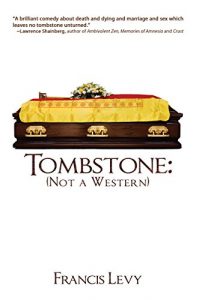Today I’m pleased to introduce you to author Francis Levy, whose new novel Tombstone: Not a Western is a comedic book about death, success, marriage, and the spirituality and funerary businesses. Sound intriguing? Wait until you read more about Levy – you’ll be doubly intrigued!
A Q&A with Francis Levy about Tombstone: Not a Western
Have you written about death before?
Yes, I did my own New Yorker obituary which appeared on the Op Ed page of the old New York Newsday laid out in New Yorker style type. Years ago, I also wrote a humor piece for The Village Voice called “Letters to the Obit Editor,” which were a series of irate letters, about decedents lives.
I also wrote a parody of Sherwin Nuland’s famous book on death and dying How We Die, for The Journal of Irreproducible Results. It was called “How We Die: My Worst Case,” about a patient who passed away with a total lack of dignity and acceptance, simply bawling about what
a raw deal he’d gotten.
 You tend to make fun of the most sacrosanct subjects? Is there anything off limits to you?
You tend to make fun of the most sacrosanct subjects? Is there anything off limits to you?
No.
Underneath the humor are you trying to say something serious about death?
The answer is yes. I am a bit like a scorned suitor. I have sour grapes. I actually am in pursuit of the same solace that everyone else seeks when they face the cosmic yawn, but I approach it by the back door—which may explain the preponderance of doggy style sex in the novel.
God appears in the novel? Do you believe in God?
I won’t say no. I just don’t believe in anthropomorphized notion of God, a God who is like a telephone operator fielding calls for help and providing answers. If there is a God, he is something that is totally inconceivable to the sensibility of someone like myself. That being said I like anything with the word “theo” in it. “Theodicy and “theocracy” are favorite words and I love Theodore as in Roosevelt and Theo as in van Gogh.
What do you think about the funeral industry?
It’s a total rip-off. It costs a fortune to die. In addition, it’s money ill-spent. Most people are really annoyed that they have to interrupt their day to attend memorials in funeral chapels. A funeral generally occurs around ll:00am which gives the mourners time to make it out to a cemetery in New Jersey (if you event is in New York) before closing. Because of this metrosexuals are always trying to modify their gym, therapy, and cheating on their partner schedules, to get to funerals—and it’s a source of frustration.
In the course of your writing have you come up with helpful hints for anyone burying a loved one?
Yes, cremation is cheaper than interment. However, couples should consider brokering a deal with their local funeral parlor in which the ashes of one partner can be buried in the casket of another. That’s one way to save a buck.
About the Book:
Levy is as concerned as the next person about finding solace in thinking about death, but he prefers to approach the subject from the back door. His finely-honed blend of humor and the absurd, along with an obsession for every detail will leave readers laughing out loud and perhaps get them thinking about their own lives, relationships, and plans for the inevitable.
The story follows New York couple Robert and Marsha Bernstein, as they explore, clash, and plan their final arrangements (so as not to leave it to their children). The Bernstein’s haplessly negotiate cremation versus interment (cremation is a better deal), shop for coffins (the Casanova vs the Jaguar), meet morticians, explore wills and trusts (getting in the middle of a financial scandal), spend time at an exclusive Arizona resort that offers death defying activities along with funeral seminars, and all the while following their hearts and dollars to the hereafter.
Levy’s first two well received novels Erotomania: A Love Story and Seven Days in Rio (Two Dollar Radio) explored and poked fun at human sexuality. In Tombstone, Levy hits the perfect pitch of comedy, spirituality, and sexuality, while exposing the ins and outs of the funerary business (yes, he says, it can cost a fortune to die).
About the Author:
Francis Levy has had stories, humor, criticism, essays, interviews and poetry published in The New York Times, The New Republic, The Washington Post, The Village Voice, The East Hampton Star, Evergreen Review, Contemporary Psychoanalysis, American Imago, Bomb and The Brooklyn Rail amongst others. He was co-founder of The Philoctetes Center for the Multidisciplinary Study of Imagination. He blogs at TheScreamingPope.com and on HuffPost. Levy received a BA from Columbia University and an M.F.A from the Yale School of Drama. He practices traditional Japanese karate and has attained the rank of Sensei or fourth degree black belt. His workout regimen was the subject of a profile in The Wall Street Journal.


 Jill-Elizabeth LinkedIn
Jill-Elizabeth LinkedIn



Leave a Reply